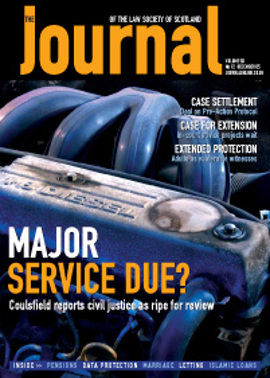Better law-making: just lip service?

The UK’s term at the helm of the EU draws to a close at the end of the year. For all the criticism that the UK has received over its “inaudible and invisible” presidency, there is no evidence that the EU has ground to a halt. On the UK’s priorities the report card is mixed.
Discussions on the EU’s future budget have not been settled and it remains to be seen whether EU leaders will be able to find common ground this year. On the other “big” question, the UK did manage to smooth over the last-minute concerns of some member states concerning the start of accession negotiations with Turkey. At the time of writing, the European Parliament has just voted on the proposed Services Directive, over 18 months after it was proposed. Its committee adopted an amendment, put forward and lobbied on by the Society through its Brussels office, that will protect the Master Policy for professional indemnity insurance and Guarantee Fund arrangements. The original Commission proposal put these into question. This timing means, however, that it will fall to the Austrian presidency that follows to foster agreement on the text among member states.
Destination Edinburgh
It is difficult to know the extent to which the UK’s presidency events have registered on practitioners’ radar. There have, however, been a large number of conferences and seminars taking place across the UK, many of interest to solicitors. Edinburgh has had its fair share, hosting a conference on developments in EU criminal law, organised by the Society, the Faculty of Advocates and the Academy of European Law in Trier. Obviously with the advent of new measures, such as the European arrest warrant, the European evidence warrant and European criminal record and bail regimes, there was much to merit attention.
Likewise, the presidency’s civil justice conference took place in Edinburgh. This looked at the similarly expanding body of EU work in the fields of cross-border civil and family law disputes. These are both important areas of EU work, which practitioners need to be aware of. The Society encourages solicitors to get involved in the debates surrounding these new initiatives and thus feed into its representational work in Brussels.
Then we come to something that has been a priority for both the UK and the European Commission – better regulation. I wouldn’t wish to suggest there is any bias in favour of Scotland’s east coast, but a further presidency conference took place in September. No prizes for guessing where.
Taking simplification seriously
There was in-depth discussion of the processes the EU uses to arrive at a piece of legislation. The EU Commissioner primarily responsible, Mr Verheugen, also spoke and seemed to be “singing from the same song book” as his audience. Rigorous impact assessment, effective consultation, the screening of legislation (and proposals) for effects on competitiveness, proper consideration of non-legislative alternatives to legislation, and simplification of the existing body of EU law were all order of the day.
It seems too that the Commission is not just blowing hot air. Almost 70 legislative proposals were withdrawn en masse in September, although only a fraction were of any great significance. A month later, the Commission published its programme for simplifying existing legislation in a range of fields of EU law.
This is not, however, the first time that the EU has committed itself to such programmes. Under the UK’s last presidency in 1992, the European Council in (surely not again) Edinburgh focused considerable attention on better regulation.
Been here before?
The concept of subsidiarity (taking decisions at the most effective level) and the withdrawal of a number of proposals that did not comply with this then relatively new principle were the topic of discussion. Efforts to simplify legislation and make it more accessible were also called for. Since then, successive Commissions have attempted to push the agenda forward. The “SLIM” (Simpler Legislation for the Internal Market) programme was established to simplify EU legislation, and the previous Commission published its own action plan on better law-making in 2002.
The effectiveness of past initiatives is open to debate. Work on simplification and consolidation has not gone as quickly as planned, but the use of consultation and impact assessments is clearly on the up. There does appear to be a genuine willingness among the current Commissioners to do more than pay lip service. For instance, the Directorate General for the Internal Market, headed by Irishman Charlie McCreevy, has made only a handful of legislative proposals since he took office. Expected directives, such as those relating to company law, have been postponed in favour of further impact assessment and consultation. “Soft law” measures, such as recommendations, have been used instead of directives. There have also been numerous consultations both on future proposals and on the general directions for future policy. The Commission’s recently published work programme for 2006 contains a shorter and arguably more focused list of legislative proposals than in previous years.
Only time will tell the extent to which a new “better law-making mentality” has taken grip among officials of the EU institutions. It is clear already, however, that the problems created by badly-drafted EU legislation affect both solicitors and their clients. Such legislation can lead to unnecessary litigation, wasting time and money. This impacts on the competitiveness of Europe’s economy more generally, and with the continuing growth of competition from China, India and elsewhere, this is not something to be complacent about.
In this issue
- Holes in Scotland's corporate killing proposals
- A month of contrasts
- Too small to be flexible?
- Engine overhaul
- Vital voices revisited
- Letting in the law
- Puzzles and paradoxes
- Legacy giving in a Scottish climate
- New deal for PI claims
- Data protection crackdown: do you comply?
- In real terms
- Access route
- Better law-making: just lip service?
- Appealing prospects
- The limits of diversification
- Cashing in on the event
- Farewell then common law marriage
- Scottish Solicitors Discipline Tribunal
- Website reviews
- Book reviews
- Unveiling the Islamic mortgage






